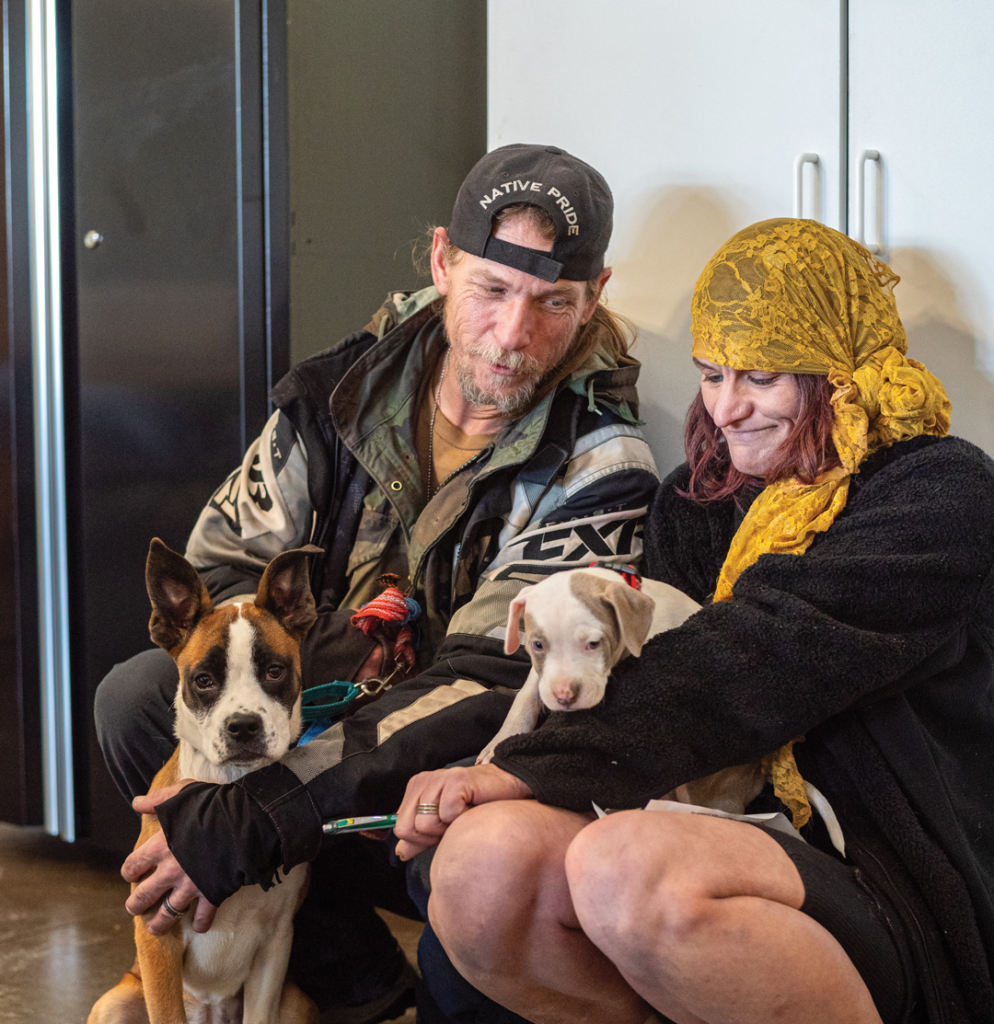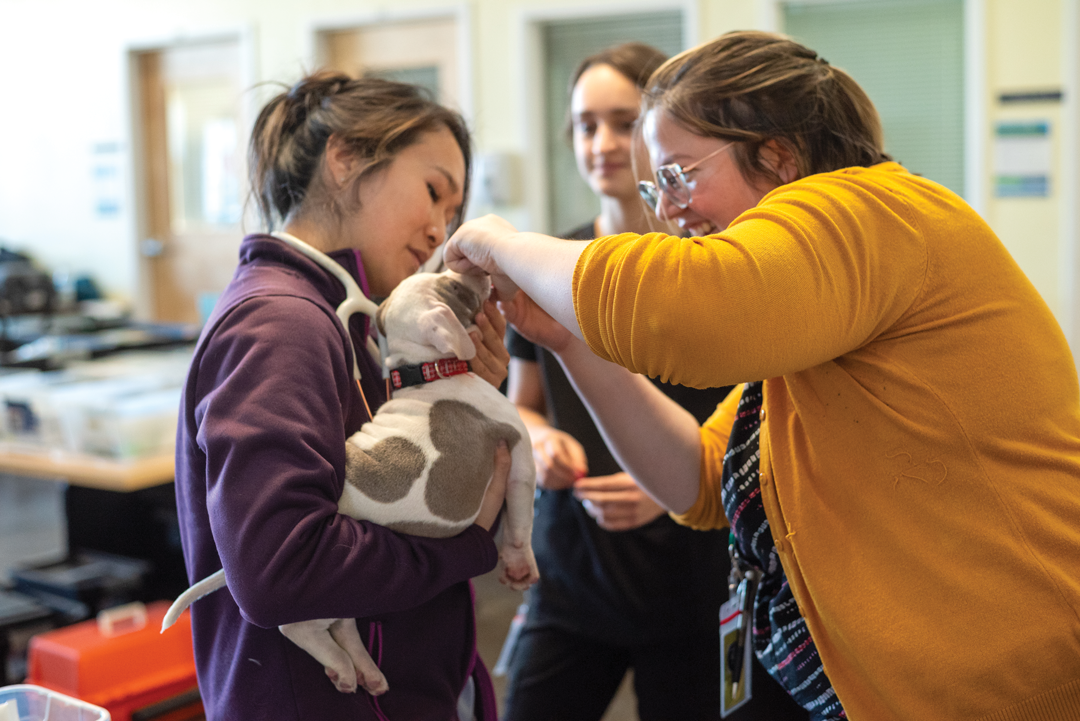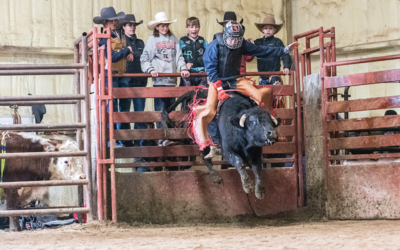Dr. Jon Geller was walking over a bridge in Nashville when he locked eyes with a pit bull who seemed sick. The dog, who belonged to a man sleeping under the bridge, seemed to be asking for help.
“It was as if he was saying to me, ‘Can’t you do something?’” Geller says.
This is a story Geller has recounted many times, mostly when people ask him why he started The Street Dog Coalition, a nonprofit based in Fort Collins that helps those experiencing homelessness care for their pets. At the time, he didn’t know the organization would evolve into hosting vet clinics across the country. He didn’t even know if it was possible to care for homeless pets: No one else was doing it, and he wasn’t interested in taking them away from their owners or “rescuing” them.
Geller likes the story because it’s symbolic. Pit bulls and the homeless have a lot in common, especially in the way society stereotypes and rejects them. It’s not a coincidence that many homeless people own pit bulls.
“The person always feels like a reject and is socially dysfunctional,” Geller says. “Their one and only friend is their pet. It’s their pet and them against the world. I’ve had people tell me that their pet is the only thing that prevented them from killing themselves.”
The gratitude the homeless have for someone caring for their pet instead of judging them is what keeps Geller and his staff going. For one day, they get to be seen as pet owners.
“They can’t believe they can get this care free of charge and scorn,” Geller says, “and it’s not just the vet care. They also love the chance to sit down and tell us the story about their pet.”
An active, healthy life
People tend to pity dogs who are with those experiencing homelessness (there are cats, but 85 percent are dogs). But Geller believes many of them have better lives.
“They’re with their owners 24/7, and that’s all they care about,” Geller says. “They live active outdoor lifestyles. They’re not lying on the couch while their owners are out doing stuff. They’re highly socialized. They’re always fed before their owners. Most of the dogs are really healthy and vigorous.”
Even so, street dogs may be riddled with parasites and may not have the protective meds to counter, say, heartworm or rabies. It’s especially dangerous for a homeless pet not to have a rabies vaccine, as they can be impounded if they bite someone. Street Dog gets those pets the basic health care they need despite many of them being healthier than housed pets.
Geller understands the public’s harsh judgment about homeless people keeping pets. He works on it himself all the time.
“It’s a challenge to be nonjudgmental, and this will challenge your ability to do that,” he says. “But I tell myself that I don’t know their story.”
Instead, Geller puts his energy toward helping vets set up clinics in more than 60 cities around the U.S. Most of them also have health care professionals for humans, dentists for people and dogs, free meals, free pet food and even free bike repair services (cycling is a main way homeless people get around). Street Dog helps subsidize those costs and advises vets on how to put on the clinics. Geller hopes to add five to 10 clinics every year.
It’s not difficult to find volunteers to run the clinics. Geller credits this to the animal-human bond that he and many others believe is crucial to overall health. He also believes that everyone needs and deserves that bond whether they are housed or not.
A lot of vets love volunteering, Geller says, and he would know since he is one.
“They love working for a liberating environment where everything is free,” he says. “We don’t get bogged down in the cost. Pets are euthanized because of the cost. We just care for their animals.”

Rev and Gypsy with their pups, Jenga and Angel. Photo by Jordan Secher.
Puppies for the newlyweds
Rev and Gypsy were at the Murphy Center for Hope in late November for Tuesday’s hour-long weekly clinic hosted by Street Dog. The organization’s main office remains in Fort Collins, and the Murphy Center is where they do a majority of their work.
Rev admits his heart hurt after he lost his blue heeler, Django, when the city deemed him a vicious animal after biting another dog in a fight and put him down. Rev admits Django was at fault, but it didn’t ease the pain nine months later.
“He meant a lot to me,” Rev says. “Dogs are wonderful.”
So his wife, Gypsy, got him a puppy: a Rhodesian Ridgeback and beagle mix. They named her Jenga. Then she got him another, Angel, a gray cutie just starting to see the world enough to ask for scratches on her chin.
Jenga listens to her “sit and wait” commands, even when she’s tempted to jump on a new person offering love. However, she wasn’t excited about getting vaccinations during their visit, so Gypsy lay next to her on the floor and soothed her with baby talk. Angel only needed a wellness check, but even that was exhausting, so she slept in Rev’s arms.
“I think I may be in love with this one,” he says.
“I know you are,” Gypsy answers.
The demand for Street Dog’s services is high—they had nearly a dozen people sign up or walk in that afternoon—but Colorado State University’s renowned vet program helps by bringing in students to care for the dogs and present more complicated cases to faculty and Street Dog vets.
The students get some training on trauma-informed care (those experiencing homelessness have hard lives), and they know the drill. They are there to care for the animals, but they are also there to listen to stories. It’s a good thing, too, because Gypsy loves talking about her pups.
Jenga already knows how to pull a wagon of supplies. She’s part of their team, and she doesn’t mind the work. “We love her so much,” Gypsy says.






